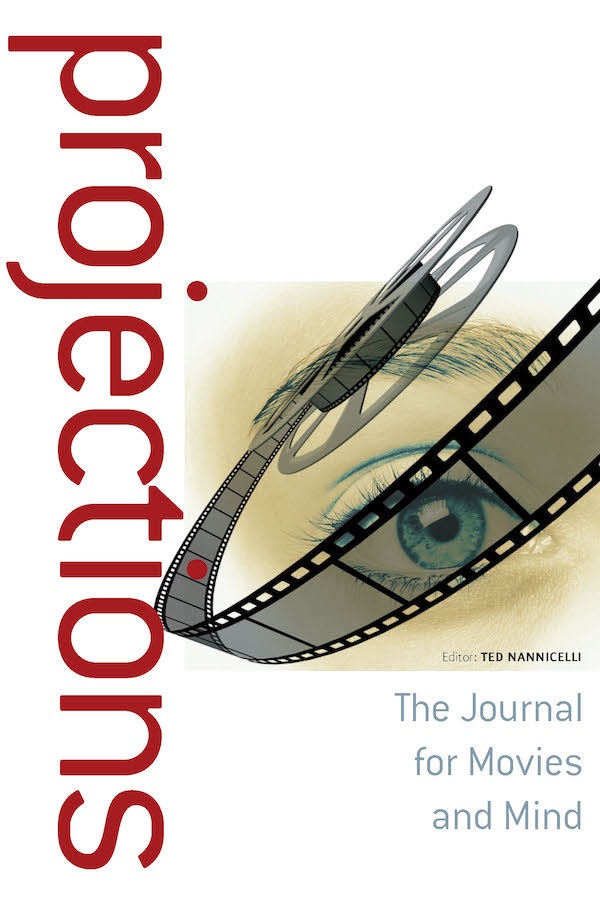
Projections
The Journal for Movies and Mind
ISSN: 1934-9688 (print) • ISSN: 1934-9696 (online) • 3 issues per year
Editor: Joseph P. Magliano, Georgia State University
Editor: Maarten Coëgnarts, University of Antwerp / LUCA School of Arts
Subjects: Film Studies
Published in association with The Society for Cognitive Studies of the Moving Image

Winner of the 2008 AAP/PSP Prose Award for Best New Journal in the Social Sciences & Humanities!
Latest Issue
Volume 19 Issue 3
Introduction: Issue 19.3
We are pleased to present the Winter issue of
Theory of Mind Negatively Predicts Reflection and Positively Predicts Moral Understanding
A key determinant of viewers’ ability to derive moral understanding from movies may be their ability to understand and reflect upon the beliefs that underlie behavior. We therefore tested whether a measure of theory of mind would predict reflection on a movie and viewers’ moral understanding of the film. We asked participants to write expressively about a lesson they derived from a film they had previously seen or were shown. Two studies demonstrated that theory of mind
Analyzing Multi-protagonist Films
This article presents a functional framework for analyzing films with multiple protagonists. Building on Tamar Yacobi's work on the center of interest, this narrative schema is characterized by a more even distribution of interest among characters, regulated by a set of compositional indicators. In order to complement David Bordwell's explanation of how we recognize the protagonist(s) in a narrative film, this article discusses seven indicators of centrality—explicit, quantitative, sequential, analogical, perspectival, thematic, and stylistic—which help us locate and analyze the compositional features that create the impression that certain films have multiple protagonists. The framework is illustrated through a brief analysis of Kleber Mendonça Filho's
Rethinking “Pleasure” When Watching Rape
A Cognitive Approach to the Ethics of “Wanting” in Sexual Violence Depictions
This article re-examines “pleasure,” a key concept in feminist discourse on the ethical implications of rape representations, by analyzing the viewer's experience of sexual violence through the lens of psychophysiological processes underlying sexual arousal and the empathy mechanisms that underpin it. Drawing on psychological and neuroscientific evidence, the article argues that rape depictions evoke “motivational wanting” processes, in which hedonic pleasure is not an intrinsic component. Additionally, it suggests that different cinematic designs foster distinct wanting experiences, shaped by the interplay of three primary factors. Ultimately, this article provides an initial step toward a theoretical framework for nuanced discussions that move beyond the homogeneous notion of “pleasure,” thereby enabling the exploration of distinct wanting experiences to which ethical meanings can be ascribed.
Adapting a Live Streamed Digital Theatre Experience Using Physiological Synchrony
Digital theatre broadcasting has risen in popularity, yet it remains relatively novel, meaning the production norms for such content have yet to be established. We measured heart rate synchrony within three live streamed performances and provided data to the filming team to inform the creative direction for the following performance. The audience demonstrated greater heart rate synchrony on the final night compared to the first two nights and rated the final night as significantly more enjoyable. We also measured movement data and narrative engagement and found that movement negatively correlated to narrative engagement and narrative engagement positively correlated with enjoyment. These results highlight the benefits of using physiological assessment of moment-by-moment audience experience and the potential for these data to shape the creative process.
Book Reviews
Nathan Carrol, ed.
Angelo Emanuele Cioffi.
Julian Hanich and Martin P. Rossouw.